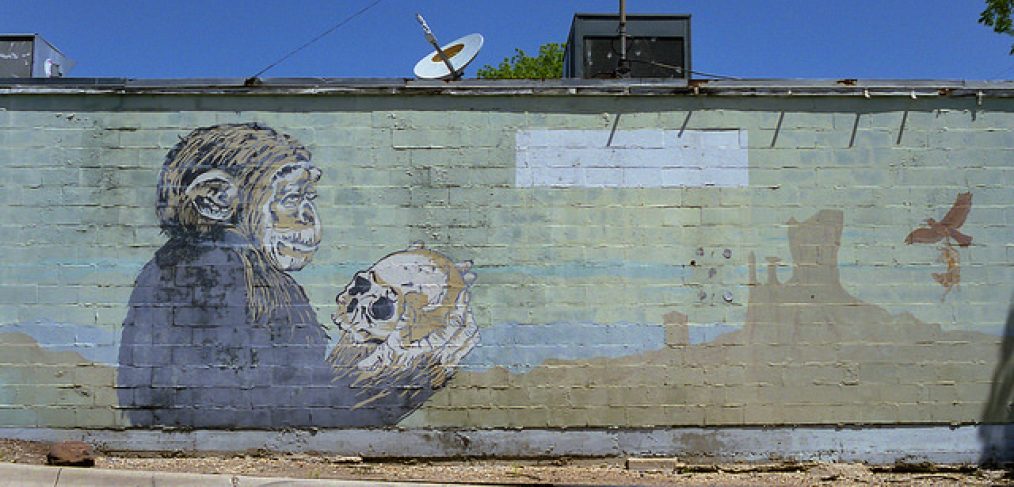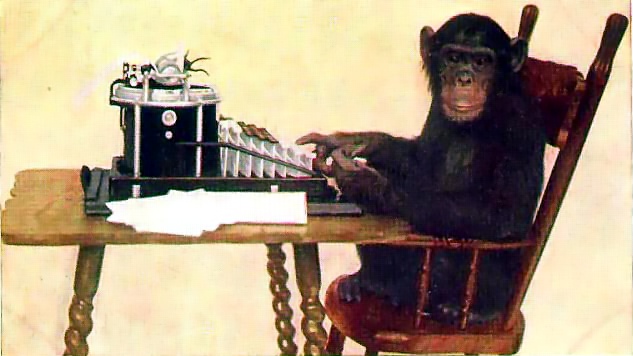
Shakespeare Monkeys : That time monkeys were funded to type the works of Shakespeare.
Back in 2003, Plymouth University students received £2,000 from the Arts Council to give six monkeys one computer for a month.
After six months, the Shakespeare monkeys had failed to produce a single word of English, broken the computer and used the keyboard as a lavatory.
They pressed a lot of S’s,” researcher Mike Phillips told Wired. “Obviously, English isn’t their first language.”
Eventually, monkeys Elmo, Gum, Heather, Holly, Mistletoe, and Rowan at Paignton produced five pages of text, composed primarily of the letter S.
In fairness to the Paignton six, the letters A, J, L, and M crept in later.
Phillips denied the project was a disaster and told the BBC they had learned “an awful lot”.
The £2,000 was spent on setting up a radio link to live stream the activities in the enclosure.
“Compared to the cost of reality TV, this was a tiny pinch of money,” Phillips said.
“It provided very stimulating and fascinating viewing.”
Ultimately the monkeys may have fallen prey to the distractions which curse many novelists.
Climbing frames. Ropes. Toys.
Thomas Huxley, a 19th-century scientist with the brilliant nickname “Darwin’s Bulldog”, is responsible for the famous theory.
It says that six eternal monkeys or apes typing on six eternal typewriters with unlimited amounts of paper and ink could eventually produce a Psalm, a Shakespearean sonnet, or even a whole book, purely by chance.
His point was that, in the same way, molecular movement could produce (his debate opponent) Bishop Wilberforce himself, purely by chance and without a Creator.
Why are we so fascinated with a thought experiment about Shakespeare monkeys?
This may be the only theorem about mathematical probability we know from pop culture rather than a lecture room.
In The Simpsons episode “Last Exit to Springfield”, Mr. Burns shows Homer “a room with a thousand monkeys on a thousand typewriters. Soon they will have written the greatest novel known to man!”
In The Hitchhiker’s Guide to the Galaxy, Douglas Adams invoked the theorem to illustrate the power of the ‘Infinite Improbability Drive’ that powered a spaceship.
From Episode 2 of his radio play: “Ford, there’s an infinite number of monkeys outside who want to talk to us about this script for Hamlet they’ve worked out.”
Maybe there’s just something innately hilarious about the image of literal monkeys rattling away forever on a set of typewriters.
Maybe we secretly hope that if we just keep TRYING, that if we keep KEEPING ON we can produce something original and eternal.
(Just.One.More.Blog)
The typing monkey experiment shows that even monkeys are too complex to be random generators.
Mike Phillips pointed out that:
“They were quite interested in the screen, and they saw that when they typed a letter, something happened. There was a level of intention there.”
Imagine the human level of intention then that goes into any creativity.
Art is not created by accident.
When you think about it, Shakespeare WAS the result of billions of monkeys trying to write stuff randomly for millions of years.
The Shakespeare monkeys turned out to be us.


You must be logged in to post a comment.